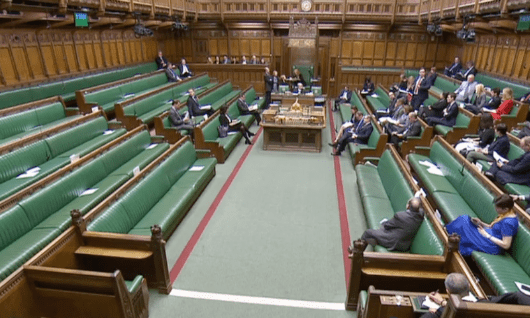The UK’s House of Commons debated climate change this week for the first time in two years, stimulated by school strikes which took place across the country on 15th February. Among the concerns raised were the security risks emanating from climate change and environmental degradation.
Conservative MP Richard Benyon, a former Minister in the Department for Environment, Food and Rural Affairs, drew attention to The Pentagon’s reference to climate change as a “risk escalator”. He pointed to the increased pressure on migration, the “huge cost of stabilising failed states” and the impact this can have on global security. He continued:
“I find it fascinating to look at the crucial nexus between environmental degradation and security. We face a huge challenge—not just because of the recommendations of the Intergovernmental Panel on Climate Change and all that comes from those, but because of the wider context and implications of not tackling climate change.” [Watch speech in full here.]
Sir Oliver Letwin, a former Minister in the Cabinet Office and one of the Conservative Party’s most senior backbench MPs, responded:
“Does he [Benyon] agree that, almost certainly, other than North Korea and the dispute over the India-Pakistan border, the single biggest risk to international security today—much too little discussed—is the question of the climate fence around Bangladesh and the possibility of rising waters forcing tens of millions of people up towards the border with Calcutta?”
Benyon agreed, arguing that even a one metre sea level rise would have a “devastating, catastrophic and tragic impact on those who live there … multiplied by an enormous magnitude because of the knock-on effect it would have on the surrounding area. It is absolutely vivid.”
School strikes
The debate was initiated by a cross-party group of MPs, led by Layla Moran of the Liberal Democrats and Caroline Lucas of the Green Party. They and many other contributors made reference to the school strikes of 15th February, which saw over 10,000 UK students protest in over 60 towns and cities in favour of “urgent and radical climate action”. “If it were not for that protest,” said Moran, I would not have applied for this debate.”
Whilst a number of MPs welcomed the opportunity to discuss an issue “more important than Brexit” (in the words of Benyon), low attendance to the debate was criticised in news reports and roundly on social media. The debate took place on a Thursday afternoon, the time at which MPs typically travel back to their constituencies to conduct casework and local meetings.

Claire Perry MP, Minister for Energy and Clean Growth, spoke on behalf of the government. “We can take pride in the UK’s record on tackling climate change,” she said, pointing to the target to reduce emissions by 57% on 1990 levels by 2032. However, she concluded: “We have to go further than those budgets.”
In January, the UK was among the UN Security Council members pushing for it to take on a stronger institutional role in monitoring and addressing the security threats emanating from climate change. At the Planetary Security Conference 2019 in The Hague, Richard Clarke of the UK’s Department for International Development spoke at the second day’s plenary on the implications of resilience for hard security and diplomacy. “There’s a real risk that climate change will completely eradicate all the work we’ve done so far”.
Article by Robert Magowan



